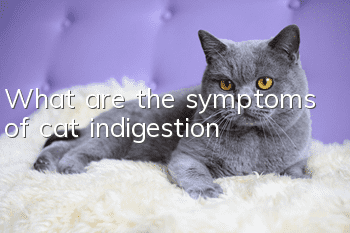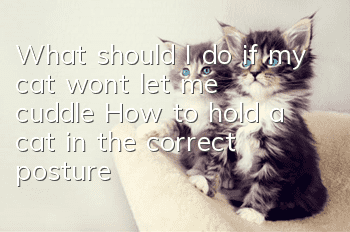What are the symptoms of cat indigestion?

Symptoms of cat indigestion include vomiting and diarrhea, elevated body temperature, decreased appetite, and extremely smelly feces. In severe cases, cats will vomit food that has not been fully digested; in severe cases, cats may have blood in their stools and have a high fever; in mild cases, cats may have a loss of appetite and be anorexic and picky eaters; in severe cases, cats may vomit and have diarrhea; indigestible ingredients accumulate in the intestines, causing excrement Big smell.
Vomiting and diarrhea
Vomiting, diarrhea, soft stools, poor energy and appetite, etc. are all symptoms of indigestion in cats. Generally, indigestion is caused by cats eating spoiled, indigestible food, or eating too quickly. In severe cases, cats will If the cat vomits food that has not been fully digested, the cat can fast for a meal first, and then eat some gastric power to promote digestion.
Elevated body temperature
For indigestion caused by gastroenteritis, the main symptoms of cats include vomiting, diarrhea, poor appetite and energy, and elevated body temperature. When the situation is not serious, the cat can fast first, then eat some probiotics to regulate the gastrointestinal tract, and then eat some light, easy-to-digest liquid food after resuming the diet. If the situation is serious, the cat may have blood in the stool and a high fever. At this time, it is best to seek medical treatment and get an anti-inflammatory shot in time.
Loss of appetite
When a cat eats too greasy food and eats human food, it can easily cause gastrointestinal overload and cause indigestion. In this case, the cat may suffer from loss of appetite, anorexia, and picky eating, and in severe cases, the cat may vomit and have diarrhea. In this regard, owners can mix some probiotics into the cat’s food to help regulate its gastrointestinal tract and promote appetite.
Poop smells bad
This is because the grain content in cat food is high and the absorbability is low, so that the indigestible ingredients accumulate in the intestines and slowly ferment, causing cats to fart and have a strong smell of excrement. Cats who are anorexic, picky eaters, have a fishy mouth, etc. should also be taken seriously. They are usually caused by certain gastrointestinal problems.
- How to deworm cats? How to deworm cats?
- Should I give my cat tap water or filtered water?
- What kind of cat is the Ragdoll cross?
- How to stimulate defecation in kittens?
- Why do I always feel itchy if I have a cat?
- How to train a Balinese cat to sleep in a cat's nest How to train a Balinese cat to sleep in a cat's nest
- Cat vomited after eating too much
- Why can’t a female cat urinate?
- Will cats get sick if they change their environment?
- There is black stuff on the cat’s testicles



